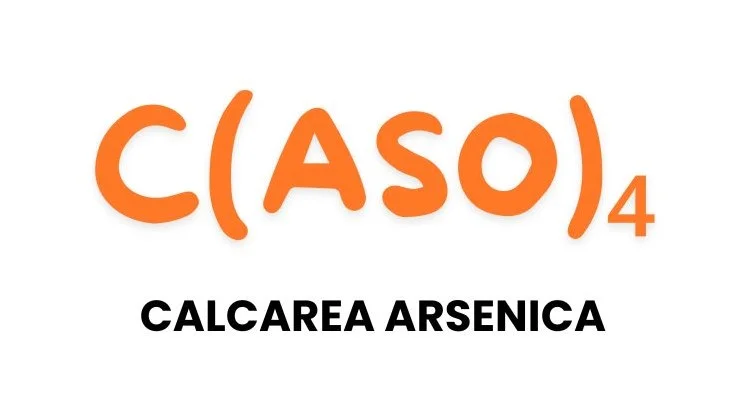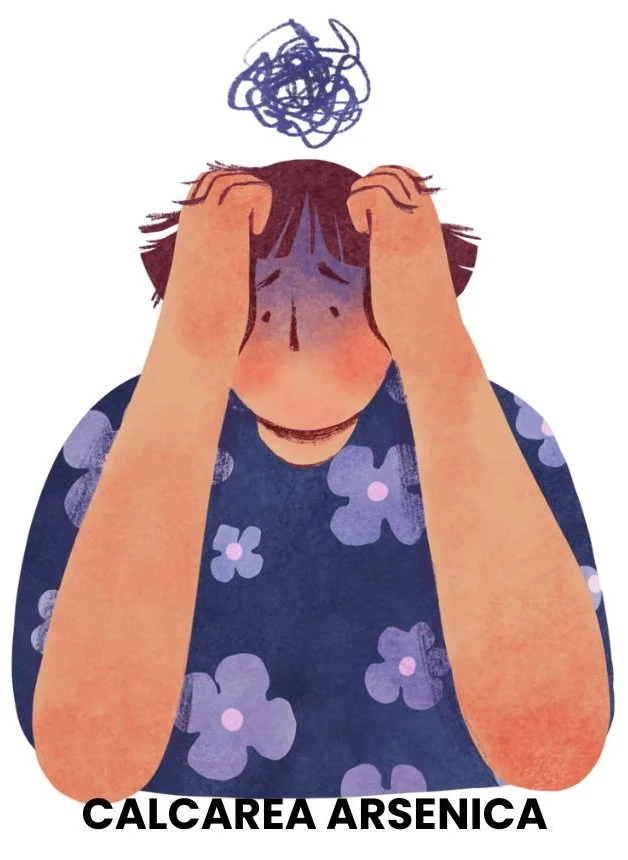Calcarea Arsenica, also known as Arsenite of Lime, is a homeopathic remedy created by combining Calcarea (calcium carbonate) and Arsenicum album (arsenic trioxide).
It is primarily used to treat various chronic conditions, particularly those related to the heart, liver, spleen, and kidneys.
This remedy is especially beneficial for fleshy women around menopause who suffer from symptoms triggered by slight emotions.

Table of Contents
ToggleSOURCE INFORMATION
Calcarea Arsenicosa is a unique homeopathic remedy that combines the properties of Calcarea carbonica and Arsenicum album.
Chemical formula: C(ASO)₄
Calcarea Carbonica
- Source: Calcarea carbonica is derived from the middle layer of oyster shells (Conchiolin) and occasionally from calcium carbonate deposits.
- This substance is rich in calcium, an essential mineral for bone health and various metabolic functions.
- Historical Use: Historically, calcium carbonate has been used in traditional medicine to treat bone disorders, digestive issues, and skin conditions.
- In homeopathy, Calcarea carbonica was introduced by Dr. Samuel Hahnemann, the founder of homeopathy, who discovered its broad range of applications for physical and mental health conditions, particularly those associated with calcium deficiency and developmental delays.
Arsenicum Album
- Source: Arsenicum album is derived from arsenic trioxide, a compound naturally occurring in minerals such as arsenopyrite, realgar, and orpiment.
- Arsenic trioxide is purified and diluted to create the homeopathic remedy.
- Historical Use: Arsenic has a long history of use in traditional and ancient medicine for its powerful effects on the body, both beneficial and toxic.
- In the 18th and 19th centuries, it was used in small doses to treat conditions like syphilis, fevers, and chronic infections.
- Arsenicum album in homeopathy was proved by Dr. Samuel Hahnemann, who found it to be effective in treating symptoms of anxiety, restlessness, digestive issues, and skin conditions, particularly those characterized by burning pain and a sense of impending doom.
Combination and Proving
- Calcarea Arsenicosa was first proved by Dr. Constantine Hering, a pioneering homeopath who played a significant role in the development and expansion of homeopathy in the United States.
- Hering conducted self-experiments to explore the effects and therapeutic potential of various substances.
- By combining Calcarea carbonica and Arsenicum album, he aimed to create a remedy that would address a broader spectrum of symptoms and conditions, leveraging the strengths of both parent substances.
Therapeutic Applications
The combination of Calcarea carbonica and Arsenicum album in Calcarea Arsenicosa is designed to harness the complementary benefits of both remedies. This includes:
- Physical Symptoms: The remedy addresses conditions like weak and slow-developing bones, delayed dentition, chronic gastrointestinal issues, heart problems, and susceptibility to infections.
- Mental Symptoms: Calcarea Arsenicosa is particularly noted for its effectiveness in treating anxiety, fearfulness, insecurity, and mistrust. It helps patients who feel dependent on others yet are anxious about being let down or deceived.
- Constitutional Benefits: The remedy is often used for individuals who are fair, fatty, and flabby, with a tendency toward coldness and recurring ailments (psoric miasm).
PATHOGENESIS
- Calcarea Arsenica affects the mind, heart, liver, spleen, and kidneys.
- It can cause symptoms such as mental anxiety, palpitations, sensitivity in the kidney region, and chronic issues in the spleen and liver.
- The remedy is known to act on patients with a fair, fatty, and flabby constitution, often chilly and susceptible to various ailments during the climacteric (menopausal) period.
CONSTITUTIONAL CHARACTERISTICS
Make-up of the Body
- Appearance: The patient is fair-skinned, overweight, and has flabby muscles. They typically resemble a classic Calcarea type.
WHAT IS CONSTITUTION IN HOMOEOPATHY?
Relation with Heat and Cold
- Sensitivity: The patient is very sensitive to cold, feeling chilly most of the time.
Miasm
- Underlying Miasm: The primary miasm influencing the patient is psora, which indicates a chronic condition marked by hypersensitivity and a tendency toward recurring ailments.
KEY CHARACTERISTICS
- Mental Symptoms: Anxiety, anger, great depression, desire for company, confusion, delusions, and illusions.
- Heart Symptoms: Palpitations, constriction, pain in the heart region, suffocative feeling, oppression, and throbbing pain extending to the arms.
- Head Symptoms: Violent rush of blood to the head, vertigo, weekly headaches, and pain around the ears, which improves by lying on the painful side.
- Stomach Symptoms: Distension in the stomach region, enlarged liver and spleen in children, pancreatic disease, belching, and beating of the heart.
- Urinary Symptoms: Sensitivity in the kidney region, albuminuria (presence of albumin in the urine), and frequent urination.
- Female Symptoms: Offensive, bloody leucorrhoea, burning pain in the uterus and vagina, and conditions related to uterine cancer.
- Back Symptoms: Pain and stiffness near the nape of the neck, violent backache, and throbbing pain.
- Extremities: Removal of inflammatory products in the veins of the lower extremities, weariness, and lameness in the lower limbs.
PSYCHOLOGICAL PROFILE OF CALCAREA ARSENICOSA

Insecurity and Mistrust
- People who need Calcarea arsenicosa feel very insecure and have a hard time trusting others.
- They think, “I need people to help me, but I can’t trust them.” This constant worry makes them highly anxious.
Dependence and Anxiety
- These individuals often depend heavily on others for support and protection, but their mistrust makes them anxious.
- They fear that the people they rely on might let them down or deceive them.
Case Example
- A woman going through menopause experienced severe palpitations triggered by the slightest anxiety or bad news.
- Her son moved abroad, and she worried he might never return, especially since her husband was ill.
- This situation made her extremely anxious about her future support.
- She called her son every week to alleviate her fears.
- Calcarea arsenicosa helped her because it addresses the combined feelings of mistrust and insecurity.
Emotionally Reactive
- Individuals requiring this remedy may react strongly to emotions.
- For example, a menopausal woman might experience palpitations from even minor emotional disturbances.
Cautious and Independent in Compensated State
- When they manage their feelings well, Calcarea arsenicosa people can be very careful, cautious, and independent.
Common Mental Symptoms
- They often experience anger, anxiety, and a strong desire for company, despite their mistrust.
- They may have confusion, delusions, and illusions, leading to great depression.
Example
- Imagine a man named John who works in a high-stress job.
- He feels he cannot trust his coworkers, thinking they might sabotage his efforts.
- Despite needing their help to succeed, his mistrust makes him anxious and insecure.
- When his trusted colleague goes on leave, John’s anxiety spikes, fearing his support system is unreliable.
- He becomes extremely cautious at work, double-checking everything and constantly seeking reassurance from others, but never fully trusting them.
Behavior in Different States
- Anxious and Insecure: When feeling insecure, they constantly worry about being let down or cheated by those they depend on.
- Cautious and Independent: When managing well, they become very careful and strive to be independent, though underlying mistrust remains.
PARTICULAR SYMPTOMS
HEADACHE
- Frequency and Nature: Weekly, often with a violent rush of blood to the head and vertigo.
- Relief: Pain improves when lying on the painful side.
Headache Example
Scenario: Sarah, a middle-aged woman, experiences severe headaches every week.
The pain is intense and accompanied by a sensation of blood rushing to her head, making her feel dizzy.
She finds relief only when she lies down on the side where the pain is most severe.
HEART
- Palpitation: The slightest emotion triggers heart palpitations.
- Pain and Constriction: There is a tight feeling and pain in the heart area, along with a suffocating sensation.
- Oppression: Throbbing pain in the back that extends to the arms, often accompanied by a rush of blood to the head and left side of the chest.
- Epilepsy: Tied to heart issues, particularly valvular diseases. An aura is felt in the heart region before an epileptic episode.
- Irregular Heartbeat: The heartbeat skips every fourth beat.
- Common Patient Profile: These heart problems are mainly seen in fleshy and chilly women nearing menopause.
- Triggers: Palpitations worsen with physical exertion, emotional stress, and climbing stairs.
- Cravings: A strong desire for alcohol is present.
Heart Example
Scenario: Jane, nearing menopause, feels her heart racing with the slightest emotion, like hearing bad news or getting excited.
She often feels a tight, painful sensation in her chest, and sometimes the pain extends to her arms and back.
When she climbs stairs, her heart palpitations worsen, and she craves alcohol to soothe her nerves.
KIDNEY
- Nephritis: Inflammation of the kidneys, with a sensitive kidney region when pressed.
- Albuminuria: Presence of albumin in the urine.
- Frequent Urination: The patient needs to urinate every hour.
Kidney Example
Scenario: Mark, suffering from nephritis, feels sharp pain when his kidney area is pressed.
His urine shows high levels of albumin, and he finds himself needing to urinate almost every hour, causing significant discomfort and inconvenience.
MODALITIES
- Aggravation: Symptoms worsen with slight exertion, emotion, and exertion.
- Amelioration: Symptoms improve when lying on the painful side.
WHAT ARE MODALITIES IN HOMOEOPATHY?
RELATIONSHIP WITH OTHER DRUGS
- Antidoted by: Carbo veg., Glonoinum (Glon.), and Pulsatilla (Puls.).
- Compatible with: Conium (Con.), Glonoinum (Glon.), Pulsatilla (Puls.), and Opium (Op.).
DOSE
- The recommended dose for Calcarea Arsenica is the third trituration.
Frequently Asked Questions (FAQs)
What is Calcarea Arsenica used for?
- Calcarea Arsenica is used to treat a variety of chronic conditions, especially in fleshy women around menopause.
- It addresses heart problems, mental anxiety, liver and spleen issues, and symptoms related to nephritis and albuminuria.
What are the main symptoms indicating Calcarea Arsenica?
- Main symptoms include palpitations triggered by slight emotions, sensitivity in the kidney region, anxiety, depression, rush of blood to the head, and symptoms related to liver and spleen enlargement.
How is Calcarea Arsenica prepared?
- Calcarea Arsenica is prepared by mixing Calcarea carbonica and Arsenicum album. The mixture is then potentized according to homeopathic principles to create the remedy.
Are there any known antidotes to Calcarea Arsenica?
- Yes, known antidotes include Carbo veg., Glonoinum, and Pulsatilla.
Can Calcarea Arsenica be used for children?
- Yes, it can be used for children, particularly for conditions like enlarged liver and spleen.
Meaning of Difficult Words
- Climacteric: The period of life marked by the transition from reproductive to non-reproductive years, typically associated with menopause.
- Albuminuria: The presence of albumin in the urine, often indicating kidney disease.
- Leucorrhea: A whitish or yellowish discharge of mucus from the vagina.
- Pancreatic Disease: Any disorder affecting the pancreas, such as pancreatitis or pancreatic cancer.
- Nephritis: Inflammation of the kidneys.
- Psora: In homeopathy, a miasm or chronic disease underlying various symptoms and conditions.
- Trituration: The process of grinding a substance to a fine powder, often used in homeopathy to prepare remedies.
Calcarea Arsenica is a comprehensive homeopathic remedy aimed at addressing a broad spectrum of chronic conditions with a particular emphasis on heart, liver, spleen, and kidney health, especially for individuals with specific constitutional tendencies.
